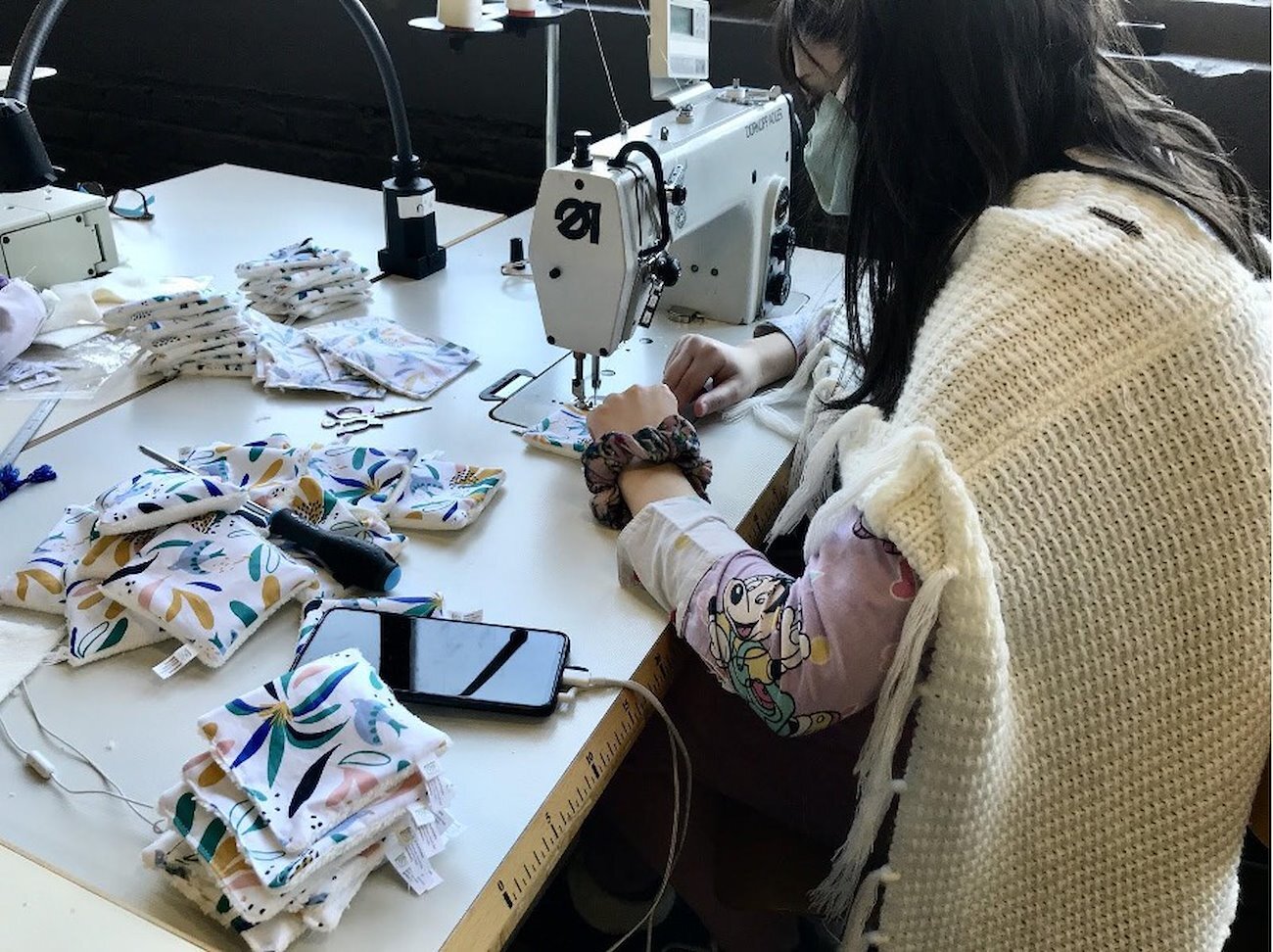YRE COMPETITION 2021
Article 19-25 years
By Justine Prados
Textiles are the second largest polluter in the world with 1.2 billion tons of greenhouse gases emitted each year. Almost everywhere, we are trying to make this industry more ethical. Through its industrial past, the north of France is a particularly fertile ground for rethinking textiles in a sustainable way.
In Roubaix, the old red brick factories line the streets of the Épeule district. Witnesses to the industrial past of what was called "the city of a thousand chimneys", some of them seem to have been abandoned for years. But at 139 rue des Arts, the former headquarters of François Roussel weavings, textiles are still at the core of activities.
In building C, you have to climb to the first floor using large steel stairs to access the Fertile Plateau. It is the third place installed in the last two years by Fashion Green Hub. Created in 2015, this association is an exchange network between fashion professionals around questions of ethical and sustainable fashion.
Coralie Vancoppenolle is the facilitator of the Plateau Fertile: "The idea of the third place is to have a concrete space to share resources, to think together ... but not only to reflect, to be able to create too!" In the upcycling workshop, the monotonous noise of the sewing machines drowns out the conversations of the seamstresses. They produce pieces from scraps of fabric and unsold items collected from partner brands such as Auchan or Blancheporte. On the other side of the door, a large space clad in metal beams welcomes the designer-residents. Big 3D printers are waiting to be started.
Since 2015, Fashion Green Hub has been the driving force behind sustainable fashion in the North. ©Justine Prados
Today, Fashion Green Hub has more than 250 partners and plans to expand internationally, but the association remains firmly established in the North. The choice of Roubaix is anything but trivial. Historical capital of the mesh, the city underwent painful deindustrialization during the second part of the twentieth century. For Arielle Levy, vice-president and co-founder of Fashion Green Hub, this trauma has forged great resilience in the territory. “It just made sense: there was this textile ecosystem that had already suffered and that made it the perfect place to invent new models,” she says.
When local and eco-responsible go hand in hand
Today, the Union of Textiles & Clothing Industries (UITH) of the North estimates that the textile industry employs 14,000 people in the department. This is 10 times less "than in the middle of the 20th century”. But in recent years, local and responsible production has become a differentiating factor in the face of competition from Asian giants. To guarantee this added value, UITH Nord created the “Nord Terre Textile” label in 2014. Regional variation of the “France Terre Textile” label, it certifies that at least 75% of the manufacturing steps of a product are carried out in approved local companies.
"We want to remind you that French manufacturing is much more virtuous than imported manufacturing," says Christelle Perz, head of economic development at UITH Nord. Today, local manufacturing halves the carbon footprint of textiles compared to production in China. This is the conclusion of a survey² carried out in December 2020 by the eco-design expert firm Cycleco for the ITU³.
Campaign carried out by the Union des Industries Textiles to promote local production. © ITU
Today, only 25 companies are labeled "Nord Terre Textile". But this certification is enjoying growing success according to Christelle Perz. “We have more and more requests. Above all, we have noticed that the companies that have best resisted the Covid are those that make made in France with locally sourced products”. For her, the great strength of the region is to benefit from an almost complete textile industry: designers, manufacturers, associations, research centers, training of textile engineers.
An observation widely shared by Loïc Baert, Managing Director of Lemahieu. This family business founded in 1947 manufactures eco-responsible underwear in Saint-André-lez-Lille. "What makes the difference is that everything is made on site, so you don't depend on other players," he says.
The company suffered the full brunt of the dismantling of the industry in the mid-1960s in the North. But if she survived, it was thanks to this local fiber. Labeled Nord Terre Textile, Lemahieu now has 130 employees. This is 40 more than in 2018, when Loïc Baert and his partner Martin Breuvart took over Lemahieu. “There is a real dynamic of relocation of production, we notice a big tension on the recruitment market for seamstresses”, details Loïc Baert.
At Fashion Green Hub, seamstresses use scraps of fabric for upcycling. © Justine Prados
But the North is not just a breeding ground for small textile companies. It is also the birthplace of many large brands: La Redoute, Kiabi and Blancheporte. For these big, well-oiled machines, the shift to responsible production is often more difficult. It is through research that they advance in this process.
Towards innovation for sustainable fashion
In Tourcoing, the European Center for Innovative Textiles (CETI) opened in 2012. Its ambition: to support professionals in the sector towards sustainability. In the fall of 2020, CETI collaborated with the Okaïdi brand on a series of cotton t-shirts made from 60% recycled fibers (and 40% from organic farming). CETI carried out the tests and invested in the unraveling machine to recycle cotton. The goal: to assess the effectiveness of a solution before it is transferred to companies for industrial use. “Businesses want to improve environmentally, but innovation is always risky. CETI takes this risk for them and helps them move forward” analyzes Marie-Pierre Chapuis, head of operational marketing at CETI.
The presence of CETI stimulates the search for sustainability for the entire sector in the North. The research center, unique in Europe, is funded by several local institutional players (the European Metropolis of Lille, the Nord department, the Hauts-de-France region). "There is a desire on the part of the public authorities to highlight the region's textile expertise and to bring it back to life through innovation," said Marie-Pierre Chapuis.
Although far from being successful, this dynamic of responsible relocation has the merit of existing. “Two years ago, we would never have put together big and small actors. Today, it is clear that the entire value chain is being reorganized locally in the service of the same vision” summarizes Arielle Levy of Fashion Green Hub.
Creating new possibilities: this is the challenge of the textile industry today. The local level makes it possible to reconnect the players in the sector to jointly rethink production methods. The North is the ideal example of a territory that uses its strengths for the benefit of responsible values. And it could, perhaps, inspire other regions to dust off their industrial sectors and invest in sustainable restructuring.
References
¹ INA, “ Crises and changes in the textile sector in the Nord-Pas-de-Calais region ”, April 16th 1965, <https://enseignants.lumni.fr/fiche-media/00000000922/crises-et-mutations-du-secteur-textile-dans-la-region-nord-pas-de-calais.html#infos>
² Payet, J. (2021). Assessment of the Carbon Footprint for the textile sector in France using Life Cycle Assessment. Sustainability (ISSN 2071-1050; CODEN: SUSTDE). MDPI publisher. Date of submission : January 13th 2021, <https://www.textile.fr/documents/1613072120_AArticle-textile-FR-APV-CYCLECO-27-janvier-2021.pdf>
³ Union of Textile Industries, “Manufacturing in France halves the carbon footprint of textiles while supporting employment”, January 28th 2021, <https://www.textile.fr/documents/1611844612_CPCycleco28-01-2021.pdf>
© 2021 YRE Competition
Article, 19-25 years
1st Place
Title: The north textile industry, the ideal network for inventing sustainable and responsible fashion
Country: France
2nd Place
Title: Villages at the foot of Luštek landfill inspire the whole Slovakia
Country: Slovakia
Honourable mentions
Title: “Moulay ali natural bathes” ... a natural healing water source that is not rationally used to support the community development of “awlad Stoute”
Country: Morocco
Title: Montijo: An Option For The Future Or An Announced Crime?
Country: Portugal



